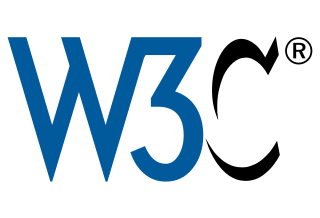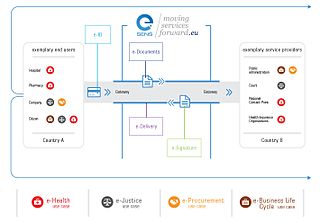
The Web Content Accessibility Guidelines (WCAG) are part of a series of web accessibility guidelines published by the Web Accessibility Initiative (WAI) of the World Wide Web Consortium (W3C), the main international standards organization for the Internet. They are a set of recommendations for making Web content more accessible, primarily for people with disabilities—but also for all user agents, including highly limited devices, such as mobile phones. WCAG 2.0 was published in December 2008 and became an ISO standard, ISO/IEC 40500:2012 in October 2012. WCAG 2.2 became a W3C Recommendation on 5 October 2023.
The digital economy is a portmanteau of digital computing and economy, and is an umbrella term that describes how traditional brick-and-mortar economic activities are being transformed by the Internet and World Wide Web technologies.

The Electronic Commerce Directive in EU law sets up an Internal Market framework for online services. Its aim is to remove obstacles to cross-border online services in the EU internal market and provide legal certainty for businesses and consumers. It establishes harmonized rules on issues such as the transparency and information requirements for online service providers; commercial communications; and electronic contracts and limitations of liability of intermediary service providers. Finally, the Directive encourages the drawing up of voluntary codes of conduct and includes articles to enhance cooperation between Member States.

Copyright infringement is the use of works protected by copyright without permission for a usage where such permission is required, thereby infringing certain exclusive rights granted to the copyright holder, such as the right to reproduce, distribute, display or perform the protected work, or to make derivative works. The copyright holder is typically the work's creator, or a publisher or other business to whom copyright has been assigned. Copyright holders routinely invoke legal and technological measures to prevent and penalize copyright infringement.
Notice and take down is a process operated by online hosts in response to court orders or allegations that content is illegal. Content is removed by the host following notice. Notice and take down is widely operated in relation to copyright infringement, as well as for libel and other illegal content. In United States and European Union law, notice and takedown is mandated as part of limited liability, or safe harbour, provisions for online hosts. As a condition for limited liability online hosts must expeditiously remove or disable access to content they host when they are notified of the alleged illegality.

Axel Voss is a German lawyer and politician of the Christian Democratic Union of Germany who has been serving as a Member of the European Parliament since 2009 and became coordinator of the European People's Party group in the Committee on Legal Affairs in 2017. His parliamentary work focuses on digital and legal topics.
Mass media regulations are a form of media policy with rules enforced by the jurisdiction of law. Guidelines for media use differ across the world. This regulation, via law, rules or procedures, can have various goals, for example intervention to protect a stated "public interest", or encouraging competition and an effective media market, or establishing common technical standards.

The General Data Protection Regulation is a European Union regulation on information privacy in the European Union (EU) and the European Economic Area (EEA). The GDPR is an important component of EU privacy law and human rights law, in particular Article 8(1) of the Charter of Fundamental Rights of the European Union. It also governs the transfer of personal data outside the EU and EEA. The GDPR's goals are to enhance individuals' control and rights over their personal information and to simplify the regulations for international business. It supersedes the Data Protection Directive 95/46/EC and, among other things, simplifies the terminology.
PhotoDNA is a proprietary image-identification and content filtering technology widely used by online service providers.

On 6 May 2015, the European Commission, led at the time by Jean-Claude Juncker, established the Digital Single Market strategy, intended to remove virtual borders, boost digital connectivity, and make it easier for consumers to access cross-border online content across the European Union. The Digital Single Market, which is one of the Commission's 10 political priorities, aims to fit the EU's single market for the digital age, moving from 28 national digital markets to a single one, and then opening up digital services to all citizens and strengthen business competitiveness in the digital economy. In other words, the Digital Single Market is a market characterized by ensuring the free movement of people, services and capital and allowing individuals and businesses to seamlessly access and engage in online activities irrespective of their nationality or place of residence. Fair competition conditions and a high level of protection of personal and consumer data are applied.

Media freedom in the European Union is a fundamental right that applies to all member states of the European Union and its citizens, as defined in the EU Charter of Fundamental Rights as well as the European Convention on Human Rights. Within the EU enlargement process, guaranteeing media freedom is named a "key indicator of a country's readiness to become part of the EU".
The Network Enforcement Act, also known colloquially as the Facebook Act, is a German law that was passed in the Bundestag in 2017 that officially aims to combat fake news, hate speech and misinformation online.
A dark pattern is "a user interface that has been carefully crafted to trick users into doing things, such as buying overpriced insurance with their purchase or signing up for recurring bills". User experience designer Harry Brignull coined the neologism on 28 July 2010 with the registration of darkpatterns.org, a "pattern library with the specific goal of naming and shaming deceptive user interfaces".
The Net Neutrality Regulation 2015 is a Regulation in EU law where article 3(3) lays down measures concerning open internet access.

The Directive on Copyright in the Digital Single Market, formally the Directive (EU) 2019/790 of the European Parliament and of the Council of 17 April 2019 on copyright and related rights in the Digital Single Market and amending Directives 96/9/EC and 2001/29/EC, is a European Union (EU) directive which has been adopted and came into force on 7 June 2019. It is intended to ensure "a well-functioning marketplace for copyright". It extends existing European Union copyright law and is a component of the EU's Digital Single Market project. The Council of the European Union describes their key goals with the Directive as protecting press publications; reducing the "value gap" between the profits made by Internet platforms and by content creators; encouraging collaboration between these two groups, and creating copyright exceptions for text- and data-mining.

Digital Markets Act Regulation 2022 (EU) 2022/1925 ("DMA"), is an EU regulation that aims to make the digital economy fairer and more contestable. The regulation entered into force on 1 November 2022 and became applicable, for the most part, on 2 May 2023.

The Online Streaming Act, commonly known as Bill C-11, is a bill introduced in the 44th Canadian Parliament. It was first introduced on November 3, 2020, by Minister of Canadian Heritage Steven Guilbeault during the second session of the 43rd Canadian Parliament. Commonly known as Bill C-10, the bill was passed in the House of Commons on June 22, 2021, but failed to pass the Senate before Parliament was dissolved for a federal election. It was reintroduced with amendments as the Online Streaming Act during the first session of the 44th Canadian Parliament in February 2022, passed in the House of Commons on June 21, 2022, and passed in the Senate on February 2, 2023. It received royal assent on April 27, 2023, after the consideration of amendments by the House.

The Online Safety Act 2023 is an act of the Parliament of the United Kingdom to regulate online speech and media. It passed on 26 October 2023 and gives the relevant Secretary of State the power, subject to parliamentary approval, to designate and suppress or record a wide range of speech and media deemed "harmful".

The Regulation to Prevent and Combat Child Sexual Abuse is a European Union regulation proposed by the European Commissioner for Home Affairs Ylva Johansson on 11 May 2022. The stated aim of the legislation is to prevent child sexual abuse online through the implementation of a number of measures, including the establishment of a framework that would make the detection and reporting of child sexual abuse material (CSAM) by digital platforms a legal requirement within the European Union.

The European Centre for Algorithmic Transparency (ECAT) provides scientific and technical expertise to support the enforcement of the Digital Services Act (DSA) and researches the impact of algorithmic systems deployed by online platforms and search engines. Launched in 2023, ECAT is part of the Joint Research Centre within the European Commission, working in close collaboration with the Directorate General Communications Networks, Content and Technology.







